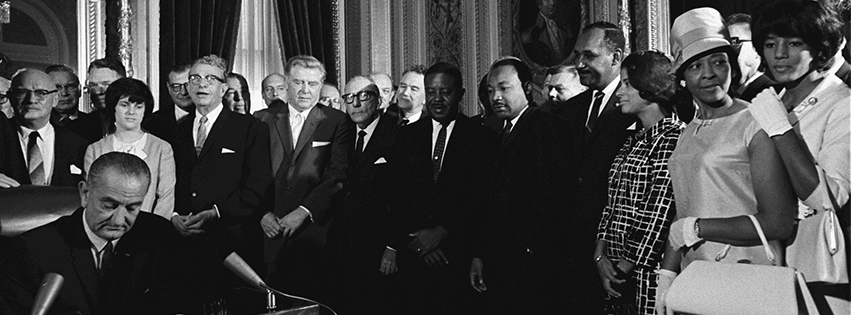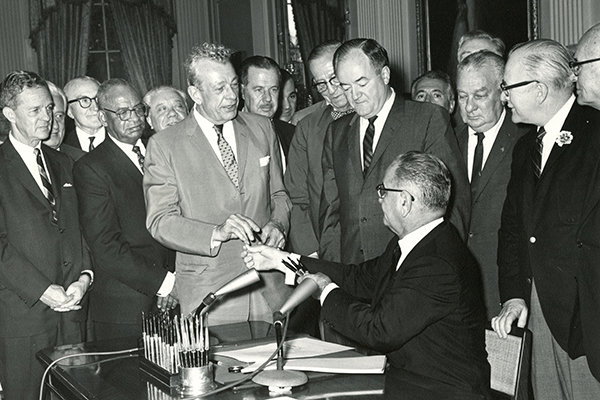
Everett McKinley Dirksen is perhaps the most well-known and influential member of Congress to have represented the Land of Lincoln in our nation’s capital. Defined by his unique personal style, an exhaustive understanding of U.S. policy and the legislative process, and a thespian’s mastery of the spoken word, he was a larger-than-life embodiment of the U.S. Senate throughout mid-20th century America.
As Senate minority leader in the 1960s, Dirksen was essential to passage of the 1964 Civil Rights Act, securing the necessary support of the Republican caucus against the firm opposition of Southern Democrats. The Dirksen Congressional Center, named in his honor, is located in his hometown of Pekin, Illinois. Its mission is to enhance the public’s understanding of Congress, its members and its policies through education, academic research, grants and the support of like-minded programs.
Altered Thinking
A reporter once asked Everett Dirksen why he supported the Civil Rights Act—what had changed his mind, so to speak. He recalled Dirksen’s reply:
“A colored man and his family sets out from Blytheville, Arkansas, for Jackson, Mississippi, and he says to himself, ‘Here is a highway I helped pay for through federal and state taxes. They tax my gas; they tax my tires; they tax my car. This is really my highway. But if I go any distance and take the kids into a comfort station, I do so at my own peril.’ It has altered my thinking.”
Of course, Dirksen did much more than fine-tune his thinking on this issue. He became the key influencer in a Congress that at long last wielded its power to help address the modern tragedies of historic prejudice, systemic exclusion and the resulting suppression of America’s most openly disenfranchised minority group. When the Civil Rights Act passed Congress, only five of its 535 members were African American. That an institution so void of ethnic diversity could eventually carry forth the bill was fairly remarkable, though it did not happen without significant conflict and strife.
 It’s worth celebrating that these American institutions of ours are becoming more diverse—little by little—and the 116th Congress is no exception. Today, there are 55 members of the Congressional Black Caucus, about 10 percent of Congress. Furthermore, 68 American lawmakers are either first- or second-generation immigrants—with three percent being foreign-born. Women now represent roughly 25 percent of both the House and the Senate; 76 members currently identify as either non-Catholic or non-Protestant; and 10 members are openly gay—a smaller statistic that nonetheless represents a significant, more recent change.
It’s worth celebrating that these American institutions of ours are becoming more diverse—little by little—and the 116th Congress is no exception. Today, there are 55 members of the Congressional Black Caucus, about 10 percent of Congress. Furthermore, 68 American lawmakers are either first- or second-generation immigrants—with three percent being foreign-born. Women now represent roughly 25 percent of both the House and the Senate; 76 members currently identify as either non-Catholic or non-Protestant; and 10 members are openly gay—a smaller statistic that nonetheless represents a significant, more recent change.
For the Betterment of All
Diversity in our institutions of power should continue to be enthusiastically welcomed, though its positive impacts on policy likely remain diminished while that diversity is concentrated heavily within a single political party. In that regard, opportunities for cross-party coalitions in an era of identity politics may also remain limited, and consequently, the possibility of the bipartisan nature of reform enjoyed by the Civil Rights Act, despite it being one of the nation’s most culturally divisive legislative achievements.
All that being said, there are many ways in which even our imperfect diversity can positively influence the country. Increased diversity in Congress may naturally result in more people of all backgrounds feeling emboldened to succeed in their lives and careers, and to find their own place among others who are already making a difference.
Personally, as the mother of three daughters, it can never be lost on me the impact of having more decision-making women in visible positions of power and influence, despite remaining significantly underrepresented in places like Congress. I know I share that feeling with many other population groups as well. Finally, if our legislative leaders can find a way to utilize more widespread diversity to break—not strengthen—the current cycles of hyper-partisanship that breed mistrust among their colleagues and constituents, then perhaps bipartisanship and its sister virtue, civility, can experience more glorious moments under the sun.
Above all, more widespread diversity and inclusion within our nation’s highest institutions of power quite simply afford our leaders the opportunity to better understand different people via their understanding of each other—and therefore, to better understand the many complex problems faced by society at any given moment in history. Indeed, it may just alter their thinking—as it did Everett McKinley Dirksen—for the betterment of us all. PM
Tiffany White is executive director of the Dirksen Congressional Center.
- Log in to post comments

